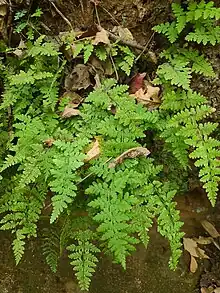| Cystopteris tennesseensis | |
|---|---|
 | |
| Scientific classification | |
| Kingdom: | Plantae |
| Clade: | Tracheophytes |
| Division: | Polypodiophyta |
| Class: | Polypodiopsida |
| Order: | Polypodiales |
| Suborder: | Aspleniineae |
| Family: | Cystopteridaceae |
| Genus: | Cystopteris |
| Species: | C. tennesseensis |
| Binomial name | |
| Cystopteris tennesseensis Shaver | |
| Synonyms | |
| |
Cystopteris tennesseensis, commonly known as the Tennessee fragile fern or Tennessee bladderfern, is a species of fern in the family Cystopteridaceae.[1][2]
Description
Cystopteris tennesseensis is a lithophytic fern, growing on calcareous rock ledges, scree, and cliffs. It has creeping rhizomes, and occasionally has misshappen bulbets.[1]
Cystopteris tennesseensis is a member of the Cystopteris hybrid complex. It originated as an allotetraploid hybrid between two diploid parents, C. bulbifera × C. protrusa.[1]
Distribution
The fern is native to the eastern United States. It occurs in the states of: Ala., Ark., Ga., Ill., Ind., Iowa, Kans., Ky., Md., Mo., N.C., Ohio., Okla., Pa., Tenn., Va., W.Va., Wis.[1]
References
- 1 2 3 4 "Cystopteris tennesseensis in Flora of North America @ efloras.org". www.efloras.org. Retrieved 2023-12-12.
- ↑ Christopher H. Haufler; Michael D. Windham; Thomas A. Ranker (1990). "Biosystematic Analysis of the Cystopteris tennesseensis (Dryopteridaceae) Complex on JSTOR". Retrieved 12 December 2023.
This article is issued from Wikipedia. The text is licensed under Creative Commons - Attribution - Sharealike. Additional terms may apply for the media files.